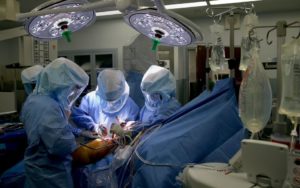In the Covid-19 pandemic scenario of current times, there is an urgent need to follow guidelines while performing surgical procedures. That being said, the top priority remains the safety of the patients as well as healthcare workers.
Over the last few months, every sphere of life has been thrown upside down, and we are bringing major changes in the way we live. While the new normal is being mandated by the coronavirus, it needs to be accepted and followed by all. But healthcare services are one of the frontline services that continued to work even when everyone was staying at home to be safe. They even worked during that time to care for patients in need of emergency care, cancer treatment, and operations that could not wait.
While the lockdown is being lifted gradually in all parts of the world, it is in the best interest of all to safeguard our nurses, doctors, and other workers working in the healthcare industry. With that in mind, the process needs to be modified, right from the time of booking an appointment to getting the surgery done. Such changes will allow surgeons and physicians to work in a safe environment so that healthcare can continue even during the tough Covid-19 times.

General Recommendations
- All endoscopic cases and elective surgeries should be postponed at present
- If a condition can be managed without surgery, it should be dealt with medicines for the time being
- All non-urgent hospital visits should be avoided
- Telehealth services should be implemented so that patients with mild symptoms can be guided over the phone or video calls
- All non-necessary hospital staff should be asked to stay at home and work from there, such as nurse managers, surgeons, radiologists, disease specialists, etc.
Recommendations for Surgical Consultations
- Avoid any in-hospital consultations for non-urgent cases
- Use the telemedicine platform as far as possible
- Consult patients over phone or video call for normal issues and follow-ups
- Follow social distancing rules while attending patients
- Restrict the number of attendants to one
- Adhere to the mask and hand sanitization measures for patients as well as their attendants
- Entry and exit points should be organized as per regulations
- All patients should be tested for coronavirus a day before the surgery
Guidelines to Follow During the Operation
- Each and every person in the operation theatre should wear adequate PPE (Personal Protective Equipment)
- The PPE should be worn in the operation room only, and it should be removed in the dedicated wash area only
- Negative pressure room should be created wherever possible
- Minimum number of care providers and personnel should be allowed in the operation theatre
- The size of the surgical team should be limited to a minimum as well
- Make sure that no one steps out of the operation theatre until the surgery is finished
- If two surgeries are to be conducted one after the other, minimum one hour gap should be given in between
- Duration of the surgery should be minimized, no training should be given at this time
- Complex and multiple procedures should be avoided at present
- Reusable tools and accessories should be disinfected and cleaned with proper procedures as soon as the surgery is over
- 1% Sodium hypochlorite solution should be used to clean the OT table, trolley, anesthesia equipment, etc. after the completion of the surgery
- Preference should be given to regional anesthesia instead of local anesthesia
Recommendations for Healthcare Workers Safety and Support
- All the members of the healthcare team should be proficient in using PPE properly
- Optimize PPE properly, including limited use of N95 respirators, reserving their use for aerosol-generating procedures, etc.
- Track the availability of PPE supplies using a PPE burn rate calculator
- Monitor healthcare providers for symptoms of Covid-19, like fever and cough
- Follow the guidelines while shifting or discharging a patient with confirmed or suspected Covid-19 infection
- Implement a phone advice line to address patients’ problems over phone only, without calling them at the clinic or hospital
Surgical teams should adapt to these rapidly changing healthcare guidelines due to the Covid-19 pandemic. The present times are critical in moderating the spread of infection. Remember, surgical interventions should be considered only if they are clearly defined as an emergency. It is vital to keep our healthcare specialists protected while treating surgical patients, and these guidelines can be extremely helpful in doing that. Best surgical care during Covid-19 times can be ensured by having a compassionate approach and a clear strategy of management.
We, at sepStream®, are dedicated to providing the best quality PPE kits, N95 respirators, sanitization solutions, and other necessary equipment that are a necessity in the present Covid-19 scenario. Apart from providing you the needed tools and equipment, our expert team can also guide you through their proper use, and give you information about the latest guidelines you have to follow while performing surgical procedures in your facility.